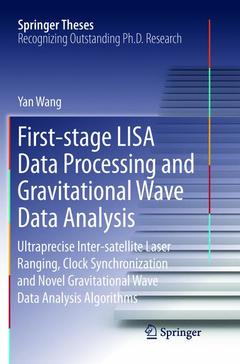First-stage LISA Data Processing and Gravitational Wave Data Analysis, Softcover reprint of the original 1st ed. 2016 Ultraprecise Inter-satellite Laser Ranging, Clock Synchronization and Novel Gravitational Wave Data Analysis Algorithms Springer Theses Series
Auteur : Wang Yan

This thesis covers a diverse set of topics related to space-based gravitational wave detectors such as the Laser Interferometer Space Antenna (LISA). The core of the thesis is devoted to the preprocessing of the interferometric link data for a LISA constellation, specifically developing optimal Kalman filters to reduce arm length noise due to clock noise. The approach is to apply Kalman filters of increasing complexity to make optimal estimates of relevant quantities such as constellation arm length, relative clock drift, and Doppler frequencies based on the available measurement data. Depending on the complexity of the filter and the simulated data, these Kalman filter estimates can provide up to a few orders of magnitude improvement over simpler estimators. While the basic concept of the LISA measurement (Time Delay Interferometry) was worked out some time ago, this work brings a level of rigor to the processing of the constellation-level data products.
The thesis concludes with some topics related to the eLISA such as a new class of phenomenological waveforms for extreme mass-ratio inspiral sources (EMRIs, one of the main source for eLISA), an octahedral space-based GW detector that does not require drag-free test masses, and some efficient template-search algorithms for the case of relatively high SNR signals.
Yan Wang received his Ph.D. in 2009 at Albert-Einstein-Institut Hannover (Max-Planck-Institut fuer Gravitationsphysik). Since 11/2014 he has been working as research assistant professor, School of Physics, University of Western Australia. He's the winner of the 2014 Stefano Braccini Thesis Prize awarded by the Gravitational Wave International Committee.
Nominated as an outstanding Ph.D. thesis by the Gravitational Wave International Committee
Won the 2014 Stefano Braccini Thesis Prize awarded by the Gravitational Wave International Committee
Selected as the most novel and innovative thesis in the field of gravitational wave physics in 2014
Includes supplementary material: sn.pub/extras
Date de parution : 03-2019
Ouvrage de 228 p.
15.5x23.5 cm
Disponible chez l'éditeur (délai d'approvisionnement : 15 jours).
Prix indicatif 105,49 €
Ajouter au panierDate de parution : 12-2015
Ouvrage de 228 p.
15.5x23.5 cm
Disponible chez l'éditeur (délai d'approvisionnement : 15 jours).
Prix indicatif 105,49 €
Ajouter au panierThèmes de First-stage LISA Data Processing and Gravitational Wave... :
Mots-clés :
Ultraprecise Inter-satellite Laser Ranging; Kalman Filter; Gravitational Wave Compressed Sensing; Likelihood Transform; Laser Interferometer Space Antenna; Gravitational Wave Data Analysis; Octahedral Gravitational Observatory; Inter-satellite Clock Synchronization; First Stage of LISA Data Processing; Phenomenological Waveforms


